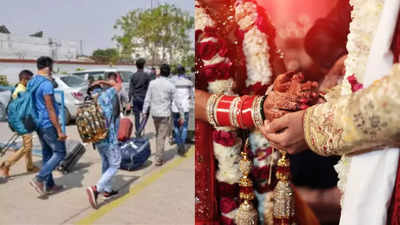- News
- City News
- kochi News
- New social integration trend: Migrant workers find love and settle down in Kerala
Trending
New social integration trend: Migrant workers find love and settle down in Kerala
Rajendra Naik from Odisha is among many migrant workers in Kerala who marry local women and settle down there. These marriages often occur due to the dowry system, as migrant workers' humble backgrounds make them practical options. Efforts by unions and organizations have also helped integrate migrants into society, providing better wages and opportunities.
KOTTAYAM: Odisha native Rajendra Naik is a happy son-in-law of Kerala. He represents the section of migrant workers who find their life match in this state and settle down here.
At a time when the native youngsters are going abroad searching for greener pastures, the new group of migrant workers are keen to marry native Keralites and settle down here.
Naik, who works as a machine operator in a plywood factory in Perumbavoor, married Kollam native Rajani in 2009. "It was an arranged marriage. A distant relative of Rajani brought the proposal, and I went to her house and met her," he said.
Now, a house under the Life Mission project of the state govt has been sanctioned for Naik. Naik, who is also the Vice President of the National Migrant Worker's Union (AITUC), said that though there are no official records about the number of migrant workers who have married native Keralites, the number will be over 70.
Most of them have applied for houses under the Life Mission project as well. Aman Naik, another Odishanative, fell in love with Pulpally native Raji. Raji's family did not oppose their relationship, and they got married in 2014. Naik works as a foreman in a timber mill in Wayanad.
Sabeenath, a native of Kattappana in Idukki, did not think twice when Bihar native Aliyar proposed to her at the workplace in Kozhikode. Her first husband left her, and she had to bring up her children from her first marriage. "Aliyar was ready to accept me with my children," she said. Now, the family has bought a small house in Perumbavoor and are settled there.
Binu Bos, General Secretary of the National Migrant Workers Union (AITUC), says that the acceptance for the migrant workers in Kerala society is due to the efforts of various organisations, including his union. "There used to be a time when the workers were subjected to exploitation.
Their daily wage in 2002 was Rs 250 when the native workers used to get Rs 700. The union created awareness amongst them regarding wages," he said. He also said that the union, as well as other organisations, encouraged them to invest their money in Kerala and educate their children in the schools here. Now there are children of those migrant workers who apply for govt jobs here, he said. According to Bos, there are around 16,000 migrant workers registered in their union.
Dr Sandhya R S, Professor and Head, Department of Sociology, University of Kerala, said that the migrant workers, apart from earning a living, are fitting into Kerala’s society quite fast. One reason for this is that they are quickly learning the local language, Malayalam, which helps them become part of the community. What makes this trend interesting is that many of these migrants aren't just staying in low-wage jobs for a long time. Some have even managed to start their businesses or secure better jobs over time, which has helped them gain stability and respect within the local society, she said.
She said that this trend of migrant workers becoming potential bridegrooms is linked to broader changes happening in Kerala.
"One of the main reasons behind this trend is the dowry system, which continues to be a big part of Kerala’s marriage culture. However, since migrant workers usually come from humble backgrounds and don't demand big dowries, many poor families now see them as a practical option for their daughters’ marriages. This has led to an increase in marriages between migrant workers and Malayali women," she added.
End of Article
FOLLOW US ON SOCIAL MEDIA
Visual Stories
Hot Picks
TOP TRENDING
Explore Every Corner
Across The Globe











